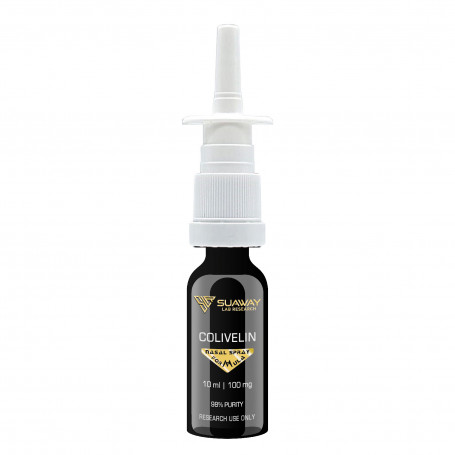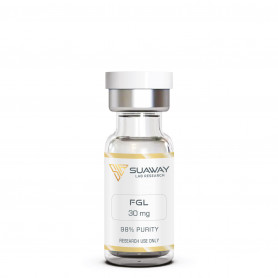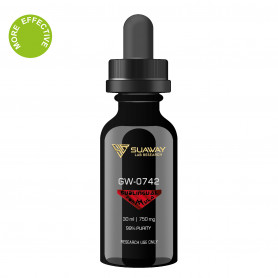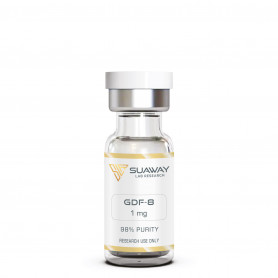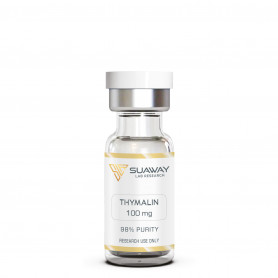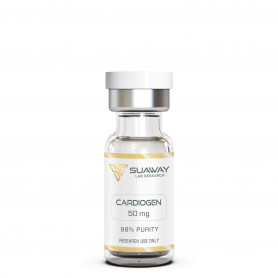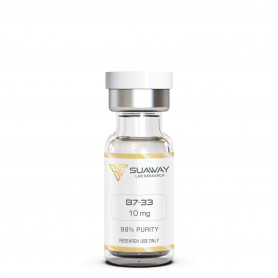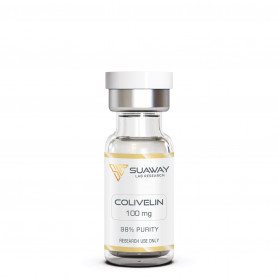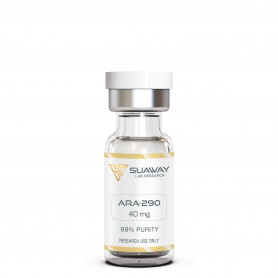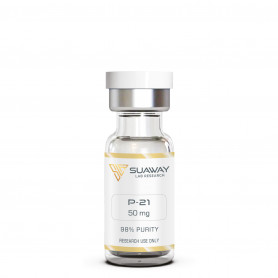COLIVELIN - 10ml/100mg
Colivelin is a neuroprotective humanin family peptide with potent long-term capacity against Aβ deposition, neuronal apoptosis, and synaptic plasticity deficits in neurodegenerative disease and Alzheimer’s disease.
Total Spray: 82 (1,22 mg per spray)
FRESHLY PREPARED SOLUTION
Description
STRUCTURE
Sequence: H-Ser-Ala-Leu-Leu-Arg-Ser-Ile-Pro-Ala-Pro-Ala-Gly-Ala-Ser-Arg-Leu-Leu-Leu-Leu- Thr-Gly-Glu-Ile-Asp-Leu-Pro-OH
Molecular Formula: C119H206N32O35
Molecular Weight: 2645.13 g/mol
CAS: 867021-83-8
Peptide Purity: greater than 98%
Other details: No TFA Salt, No Mannitol
Storage: This product must be stored at 4°C. No suitable for freezing.
DESCRITPION
Colivelin was initially discovered in 2005 and is the most powerful member of the humanin family of neuroprotective peptides. It has a rescue function against insults associated with Alzheimer's disease in both in vitro and in vivo studies (AD).
It is a hybrid peptide that has 26 amino acids and was initially discovered in 2005. Since its discovery in 2001, the HN family has been the focus of the attention of the scientific community. This is because the members of this family not only exert neuroprotective action in vitro against insults related to Alzheimer's disease, but they also reverse deficits in memory, orientation, and learning that are induced in vivo by pharmacological means in experimental animals. In more recent research, HN peptides have been demonstrated to alleviate cognitive deficits in transgenic mouse models of Alzheimer's disease, in addition to reducing the shape and deposition of Aβ aggregates.
Colivelin was produced as a new-generation HN derivative by integrating the effects of two neuroprotective peptide units. These units are the modified PAGASRLLLLTGEIDLP segment of HN and the activity dependant neurotrophic factor-9 SALLRSIPA (ADNF-9). Colivelin demonstrated strong anti-AD efficacy both in vitro and in vivo in three distinct Alzheimer's disease (AD) models. Its anti-AD activity in vitro was 108 times more effective than that of the parent HN compound. In addition, it was shown that it shields neurons from the death process that is associated with neurodegeneration or alcohol-induced apoptosis.
Colivelin is a neuroprotective peptide and it is also a powerful activator of STAT3. It inhibits neuronal death by activating STAT3 in vitro.
Colivelin has been shown to have long-term protective benefits against neurotoxicity, Aβ deposition, neuronal death, and synaptic plasticity deficiencies in neurodegenerative disease. Colivelin might one day be used to treat Alzheimer's disease as well as ischemic brain injuries.
The neuroprotective impact of humanin was amplified by the synthesis of this hybrid peptide (HN). Colivelin is made up of Activity-Dependent Neurotrophic Factor (ADNF), which has its C-terminus fused to AGA-(C8R) HNG17, which is a powerful HN derivative.
Colivelin inhibits the process of cell death that is caused by the overexpression of the genes that are responsible for familial Alzheimer's disease (FAD) and beta-amyloid. Colivelin treatment resulted in a reduction of the neurological impairments as well as the infarct lesion caused by cerebral ischemia.
Colivelin reduced axonal damage & neuronal death in brain tissue, which was related to the higher anti-apoptotic expression of genes in ischemic neurons as well as improved axonal development up to two weeks after the stroke. This finding was significant.
In addition, Colivelin induced activation of the STAT3 signaling pathway, which may have been a factor in its protective action against neuronal death and promotion of axon development. After an ischemic stroke, Colivelin causes an increase in anti-apoptotic gene expression and activates JAK/STAT3 signaling, both of which may contribute to the effects of rescuing ischemic neuronal death or axonal reorganization.
The experimental data found in the scientific literature indicates that both extracellular and intracellular activities are involved in the biological activity of the HN family. The first of them may be accomplished by the binding of HN peptides to cell-surface receptors and the subsequent activation of suitable signaling cascades, such as the JAK2/STAT3 pathway, for example.
In symptomatic 9-month-old APP/PS1 mice, administering colivelin intranasally at a dose of 1 nmol per day for three weeks enhanced the animals' performance on learning and memory activities (the new object recognition task, Morris water maze).
Colivelin treatment at a dose of 20 ug/day intraperitoneally for six days improved spatial memory in 19-month-old PDAPPV717I Alzheimer's disease model mice. This treatment also decreased the deposition of amyloid beta, neuroinflammation, and neuronal cell death. The suppression of p38 MAPK contributed to the therapeutic effect in some measures. Through the stimulation of STAT3 signaling and the STAT3-mediated enhancement of cholinergic neurotransmission, intranasally given colivelin was able to ameliorate the memory deficits that were caused by Aβ. In the Tg2576 and intracerebroventricular A42 mouse models of Alzheimer's disease, intranasal administration of colivelin at a dose of 5 nmol every other day for three weeks was able to restore cognitive function. This was accomplished by activation/restoration of the JAK2/STAT3 signaling & restoration of cholinergic neurotransmission.
REFERENCES
M. Kostomoiri et al., "New labeled derivatives of the neuroprotective peptide colivelin: Synthesis, characterization, and first in vitro and in vivo applications" ScienceDirect[]
M. Yamada et al., "Nasal Colivelin Treatment Ameliorates Memory Impairment Related to Alzheimer's Disease" [Nature]
M. Matsuoka et al., "Humanin and colivelin: neuronal-death-suppressing peptides for Alzheimer's disease and amyotrophic lateral sclerosis" [PubMed]
T. Vhiba et al., "Development of a Femtomolar-Acting Humanin Derivative Named Colivelin by Attaching Activity-Dependent Neurotrophic Factor to Its N Terminus: Characterization of Colivelin-Mediated Neuroprotection against Alzheimer's Disease-Relevant Insults In Vitro and In Vivo" [The Journal of Neuroscience]
K. Oikawa ert al., "P2-328: The role of colivelin, a novel neuroprotective peptide, on hippocampal synaptic plasticity" [The Journal of the Alzheimer's Association]
H. Zhao et al., "Colivelin Rescues Ischemic Neuron and Axons Involving JAK/STAT3 Signaling Pathway" [PubMed]
DISCLAIMER
This product is intendend for lab research and development use only. These studies are performed outside of the body. This product is not medicines or drugs and has not been approved by the FDA or EMA to prevent, treat or cure any medical condition, ailment or disease. Bodily introduction of any kind into humans or animals is strictly forbidden by law. This product should only be handled by licensed, qualified professionals.
All product information provided on this website is for informational and educational purposes only.

